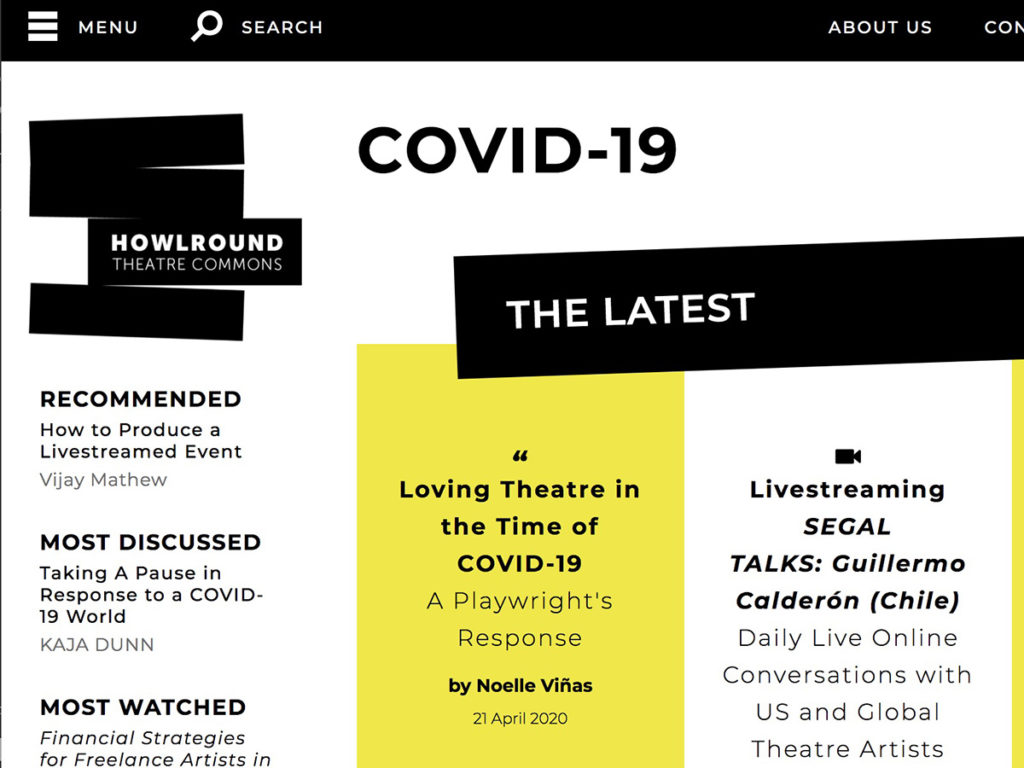HowlRound Offering Theatre Makers a Haven in a Pandemic

By Erin Clossey
Long before a pandemic drove most of the creative world online, HowlRound Theatre Commons offered artists from around the world a digital space to share and amplify ideas about making theatre.
But since COVID-19 has forced artists to rethink how they engage with audiences and survive social distancing, HowlRound, a free and open platform administered out of Emerson College’s Office of the Arts, is reaching more and more people hungry to connect, collaborate, and commiserate around sustaining and advancing theatre.
“All of our work is driven by the energy of the theatre field,” said Jamie Gahlon, director and co-founder of HowlRound. “The design of the platform is really suited to be responsive in real time to whatever issues are coming up. It’s been a real privilege to rise to this challenge.”
HowlRound
COVID-19 Events and Resources
In a 30-day stretch between mid-March and mid-April, 70,000 users made their way to HowlRound – a 75 percent increase over the typical monthly average. In March, the platform livestreamed 23 events on topics ranging from resources for freelance artists to how theatre professors are adapting to online instruction, to playwriting classes.
One event, “Artists in a Time of Global Pandemic,” drew 4,500 unique views from 38 countries and all 50 states; anything over 1,000 uniques for a given event would be considered a blockbuster pre-COVID-19, according to Gahlon. Users collectively spent nearly 1,400 hours watching the session on HowlRound TV.
“It’s not just that people were popping in and out, they were staying and engaging, which is really amazing,” Gahlon said.
When there isn’t a viral pandemic raging, HowlRound organizes and/or televises in-person “convenings” from around the world, in addition to publishing content, including essays and podcasts, contributed by users who share HowlRound’s values around creating authentically inclusive theatre.
HowlRound “isn’t jumping on any bandwagons to make their content ‘digitally friendly,’” said user and Emerson alumna Abigail Vega ’11, who co-organized the artist resources panel.
For years, the platform has been asking what it means to make an event truly accessible, how travel can be curbed to mitigate climate change, how to best share knowledge across geographic distance, Vega said. “And then the world changed, and they were ready for it.”
HowlRound’s content, as always, is driven by the desires, needs, and interests of HowlRound’s users. As disruptions to life-as-usual goes on, many of the requests coming in are for practical advice and resources, Gahlon said.
“I think the biggest thing is obviously, freelance artists are the ones hit hardest by all of the cancellations and postponements of theatre events,” Gahlon said. “Many of them also … have second jobs in the service sectors and many of those are gone too, so there’s an immediate financial need.”
The most watched video on the site as of writing was “Financial Strategies for Freelance Artists in a Time of Crisis.” The most discussed essay was “Taking a Pause in Response to a COVID-19 World,” about taking time to grieve, feel, and appreciate when days are filled with treading water and trying to maintain some semblance of normal.
As a primarily digital resource, HowlRound itself hasn’t had many disruptions to its day-to-day operations, and is even in a position to help some of its users. The site’s cultural strategist and co-founder, Vijay Mathew, offers a tutorial on “How to Produce a Livestreamed Event,” for any other theatre makers out there who may want to produce their own conversations. And HowlRound offers modest honorariums to contributing writers, a small financial boost in a lean time.
But beyond the immediate financial crisis affecting artists, theaters, and companies, there is another way that HowlRound is having an impact on the theatre world. They are helping theatre makers think about how they may not merely survive this crisis, but harness it to the good of theatre and society.
Playwright Noelle Viñas submitted an essay, “Loving Theatre in the Time of COVID-19,” about “reframing theatre as an art of the now rather than an art of futurity.” A livestreamed discussion with playwright Crystal Skillman explores “Writing from Shock: Writing During a Pandemic.”
“I think there’s this other question around how do we bring our creativity to bear in this moment? What is the role of artists in this moment and how do we take the circumstances and create something generative and new?” Gahlon said.
“HowlRound is so emblematic of Emerson’s core values,” she added, “and I think it’s exciting that through our work on HowlRound, we can represent Emerson in this moment in this global way.”
Categories